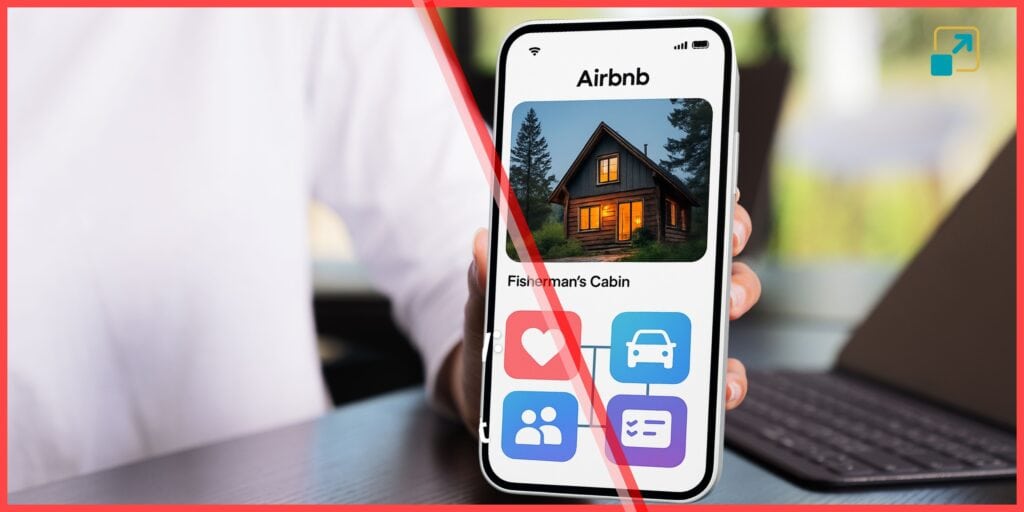I recently listened to Brian Chesky’s new interview on The Verge, and it immediately clicked. Much of what he shared directly confirms ideas I’ve written about over the past year. Whether it’s Airbnb’s product direction or its deeper platform ambitions, Chesky laid out the long-term vision more explicitly than ever.
Below, I break it down into five key chapters—each one relevant to how Airbnb is building the next phase of its marketplace, and what it might mean for vacation rental professionals like you.
Chapter 1: The Lifestyle Super App
Airbnb doesn’t just want to be where people book places to stay. It wants to become part of your everyday life. The long-term goal is to turn the Airbnb app into something you might use every week, not just when you’re traveling.
Here’s how:
- A social graph, based on real-world interactions—like shared trips or co-experienced activities.
- A growing list of verticals and services—from hiring chefs to fitness classes, or tools for renting out your car, organizing your next trip, or even finding a roommate.
- Soon, an AI concierge to connect the dots—helping users plan, book, and coordinate everything smoothly.
All of these point to one thing: Airbnb wants to become a lifestyle brand available in your pocket at any time.
It’s also clear that this isn’t about cheap travel anymore. Airbnb is positioning itself as an aspirational brand. Many new listings, services, and experiences are premium—and that’s intentional. As Chesky puts it, Airbnb is not just offering “rooms” anymore, but participating in the broader experience economy.
Now, a quick side note: I’m personally not convinced that bringing back celebrity Experiences is still relevant. It made headlines when Airbnb first launched Experiences, but in 2025, it feels a little tired. These events may offer PR value, but as a scalable product, the appeal may be limited.
Strategic Outlook for Managers:
This “super app” strategy is similar to what WeChat achieved in China and what Uber now aims for in the West. Most U.S. travel apps that tried to be all things to all people have struggled. Airbnb’s edge? Its trust, payment, and identity systems are already strong. Still, for vacation rental managers, the risk is distraction: if Airbnb’s focus shifts away from only bringing you guests and bookings, you’ll need to keep watch to make sure your core business doesn’t lose out.
Chapter 2: Marketplace Success—Airbnb’s Core Formula
Chesky clearly understands what makes a two-sided marketplace thrive. And Airbnb has quietly built real strengths that competitors like Vrbo and Booking.com still haven’t matched.
- Payment Infrastructure Airbnb has invested heavily in global payment systems that go far beyond simple transactions. The platform can:
- Handle dozens of currencies and local payment types
- Split payouts between multiple stakeholders (e.g., hosts, co-hosts, cleaners)
- Manage complex payment logic across listings and services
- Trust & Safety Chesky describes Airbnb as a “trust platform.” With over 200 million verified user profiles, it offers:
- Two-way reviews and ratings
- Government ID checks
- Secure messaging and identity layers
- Resolution centers and refund systems
- Supply & Curation Unlike platforms that wait for supply to find them, Airbnb has proactively built its inventory—both through campaigns to attract new hosts and efforts to curate the quality of listings. Chesky shared that this same formula will now be applied to service providers. Whether it’s photographers or surf instructors, Airbnb plans to bring in new categories and raise the bar for what’s available.
Strategic Outlook for Managers:
Few platforms have managed payments, trust, and supply at global scale—Amazon and eBay come close. But Booking.com, for example, is still catching up on trust and payments. Airbnb’s approach is unique. For managers, this means less friction and more international reach—but keep an eye on how new service providers are onboarded, as overlap with your own vendor network could happen.
Chapter 3: Borrowing from Amazon’s Playbook
Chesky made no effort to hide the comparison: Airbnb is consciously modeling parts of its strategy on Amazon.com.
Phase 1: Marketplace Expansion
Just like Amazon started with books and expanded into almost every retail category, Airbnb is expanding beyond homes. But what’s most striking is the speed and scale. Instead of rolling out new verticals slowly, Airbnb is launching them across 100+ cities at once. These aren’t experiments—they’re full-scale deployments.
As Chesky put it, “we’re adding one or two new verticals a year, and we’ll keep doing that for a decade.” This isn’t a side hustle—it’s the growth engine.
Phase 2: Embedded Tools for Service Providers
This part may be the most relevant for anyone in the vacation rental or local service ecosystem. Airbnb wants to be more than a discovery platform—it wants to become the operating system for small service businesses.
Chesky explained that most platforms in this space (like Thumbtack or Angi) function as directories. Service providers often try to convert leads off-platform to avoid paying commission. That means the platform doesn’t handle scheduling, payments, or follow-ups. Airbnb wants to change that.
He said, “We want to not only help people find the customer, but run their back office too.”
Here’s what that could look like:
- A chef using Airbnb to manage bookings, payments, guest preferences, and schedules
- A photographer tracking event types and client feedback directly in Airbnb
- A fitness instructor building their entire business model within the Airbnb app
For hosts, it could mean sourcing cleaning, maintenance, and local concierge help directly inside Airbnb—without a third-party PMS. In 2025, Airbnb is supposed to launch its Host Service Marketplace, where third-party software providers of revenue management, advanced guest messaging, and task management will offer their services to hosts and property managers.
This kind of infrastructure play is significant. It turns Airbnb into both a marketplace and a service management tool. And if Airbnb’s host-facing service marketplace (expected to launch soon) gains traction, it could draw more hosts away from PMS platforms entirely.
Strategic Outlook for Managers:
No major U.S. marketplace has succeeded in managing both demand and the back office for so many categories at scale—Amazon has come closest with its seller tools. Thumbtack and Angi fell short by acting mostly as lead generators. Airbnb’s success will depend on making these tools simple, sticky, and directly valuable to both guests and providers. For managers, this is both an opportunity and a risk: will Airbnb’s new service marketplace support your business, or compete with your own value-add? Watch for overlap, and be ready to reinforce your unique offering.
Chapter 4: A Real-Life Social Network
This is where Airbnb’s ambitions take an unexpected turn—and one that aligns with something I’ve long predicted.
Airbnb wants to become a real-world social network.
But unlike traditional social platforms, Airbnb’s connections are built around real-life, high-trust interactions:
- You stayed in someone’s home
- You hosted someone
- You joined an Experience with a group
- You traveled with a friend or co-worker
Chesky said that they are actively exploring ways for people to stay in touch after these moments. That could mean:
- Adding past travel companions to a friend list
- Connecting with guests you hosted and enjoyed
- Matching with a potential roommate or future travel buddy
Unlike social graphs based on likes and follows, this one is built on shared time, trust, and transactions. That’s arguably more valuable—and more defensible.
It also speaks to Chesky’s broader mission: fighting loneliness. Airbnb isn’t just about accommodations anymore—it’s aiming to help people feel connected.
Strategic Outlook for Managers:
This is uncharted territory. Facebook tried to go “offline” with events, but most digital networks fail to build true real-life bonds. Airbnb’s edge is that every connection is rooted in a paid, verified interaction. If done well, this could mean more loyalty and recurring business for you—but if social messaging distracts from bookings or adds complexity to your workflow, it may also be a challenge. Keep an eye on how these social features are rolled out and whether they add genuine value to your operations.
Chapter 5: The AI Concierge (aka Agentic App)
Finally, there’s Airbnb’s most futuristic bet: the agentic app, or what we might call the AI concierge.
Chesky described it as “a generative app” that will do more than answer support questions. It will become a travel planner, a decision assistant, and possibly even a social coordinator. Think of it as Siri—but with access to your travel history, group preferences, and personal tastes.
This smart layer could:
- Plan a full itinerary based on where you’ve stayed and what you liked
- Recommend experiences, services, or co-travelers based on your network
- Resolve issues before you ever need to contact customer service
- Connect you to hosts or local services through natural language prompts
It’s also key to the lifestyle super app strategy. The AI layer is the glue that could connect the homes, services, social graph, and payments infrastructure into one seamless user experience.
For operators, this means new types of guest expectations. As Airbnb gets better at knowing what a guest wants, your listings and services will need to align with those insights to stay visible and competitive.
Strategic Outlook for Managers:
AI “concierges” have become a buzzword, but very few platforms have made them practical for travel. If Airbnb gets it right, it could raise the bar for guest personalization—and your listings will need to keep up. But remember: more automation can also mean less personal control. Stay alert to changes in how Airbnb surfaces or books your properties.
| Chapter | Is this new? | Who tried it before? | Airbnb’s strength | Watch out for… |
|---|---|---|---|---|
| Lifestyle Super App | Rare in the West | WeChat (China), Uber (attempted) | Brand, trust, payments, scale | Focus drift; core rental neglected |
| Marketplace Success Formula | Unique blend | Amazon, eBay (parts), Booking.com | Trust+Payments+Supply | Overlap with your service providers |
| Marketplace + Embedded Tools | Still evolving | Amazon, Angi, Thumbtack | One platform for supply & ops | Competition with PMS & local partners |
| Real-Life Social Network | Very novel | Facebook, Meetup (in parts) | Verified, transaction-based | Social distraction, privacy, complexity |
| AI Concierge (Agentic App) | Hype everywhere | Google, OpenAI, Expedia, Kayak | Data, guest knowledge | Losing personal touch, less control |
For vacation rental managers, Airbnb’s ambitions are huge—and will bring both opportunities and risks. As Chesky’s vision takes shape, keep a close watch on where your business fits. If Airbnb’s super app, new services, or social features support your bookings and guest experience, lean in. But if priorities shift or your value proposition is threatened, be ready to adapt—because the platform you depend on today may look very different in just a few years.
Thibault Masson is a leading expert in vacation rental revenue management and dynamic pricing strategies. As Head of Product Marketing at PriceLabs and founder of Rental Scale-Up, Thibault empowers hosts and property managers with actionable insights and data-driven solutions. With over a decade managing luxury rentals in Bali and St. Barths, he is a sought-after industry speaker and prolific content creator, making complex topics simple for global audiences.








